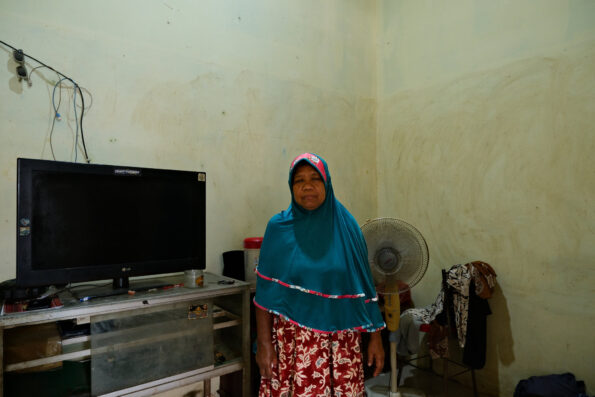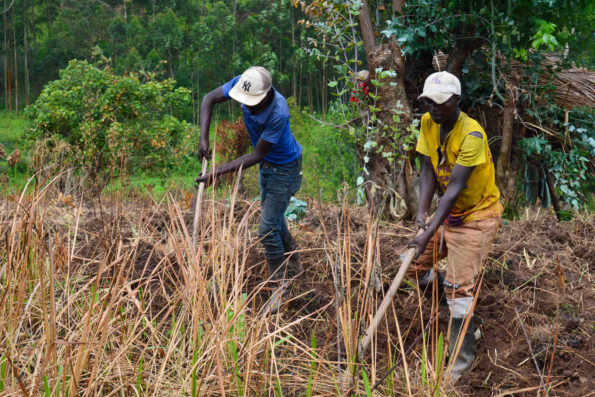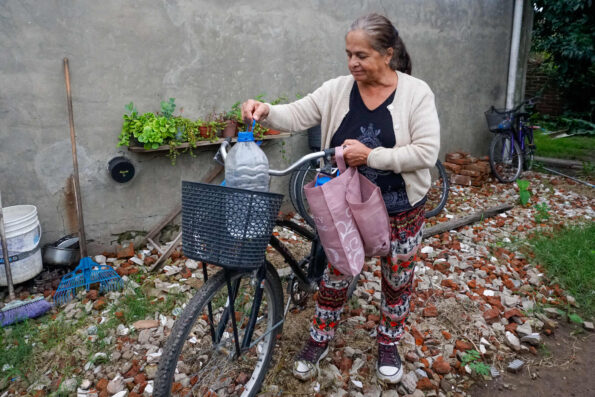
Lucila Pellettieri, GPJ Argentina
Julio Rodríguez, an employee of the Zero Waste Center, peels computer cables, separating the plastic from the copper. Both recovered materials are sold to companies that reuse them. The center employs 18 workers, two security guards, an accountant and a marketing specialist.
BUENOS AIRES, ARGENTINA — From the head of a table full of half-built computers, Jorge Amar oversees the work of a dozen high school students cleaning parts, adjusting cables and assembling computers from discarded electronics.
Today, the last day of Amar’s training course at a waste recycling center, each participating student is to present two functional computers made from recovered parts. Each student who passes the test takes one computer home and gives the other to his or her school.
“How would you defend this computer?” Amar asks a student. “If you had to convince someone to use or buy a computer made from the remains of other computers, what would you say to them?”
“I would tell them to choose it because it works well, it is much cheaper than any other computer, and by using it they contribute to there being less pollution – and in the plant there is more work,” the young woman responds.
Amar listens to her proudly, smiling with approval before continuing with his questionnaire.
A factory worker approaches Amar with a question. Another lets him know a customer has requested a discount on a computer printer. The center’s marketing specialist calls to ask what photo Amar wants to upload to the Web page. As deftly as an octopus, Amar reaches into all aspects of the operation at once.
In everything he does, Amar underscores the overlooked value of electronic waste.
“Waste is a serious problem because it does not have a price,” he says. “You have to pay to get rid of it.”
Amar is out to change that equation.
“We do everything the opposite,” he says. “We put a price to waste, and we go out to find who is able to use it in an industrial process.”
Amar directs the Centro de Basura Zero, or Zero Waste Center, a nonprofit civil association that aims to diminish pollution, the digital gap and unemployment by recycling electronic waste and donating reconditioned computers.
Argentina produces more and more electronic waste each year but does not have comprehensive laws to regulate its disposal. By demonstrating that electronic waste recycling can be self-sustaining, Amar encourages others to start up recycling centers. He provides free training to people interested in joining the business.
Improper disposal of electronic waste causes dangerous pollution. While computers and other electronic appliances are harmless while in use, they emit toxic substances such as lead and mercury when they decompose in landfills, explains Viviana Miriam Ambrosi, the director of environment issues at the National University of La Plata.
“The production of electronic waste is growing,” she says.
Argentina produced 120,000 tons of electronic waste in 2011, Ambrosi says. In 2014 it produced 140,000 tons. The province of Buenos Aires produces half the nation’s electronic waste.
However, most of what passes for electronic waste has value: Optimally treated, 25 percent of it can be reused and 72 percent can be recycled, Ambrosi says.
The Zero Waste Center, founded in 2008 by the Trade Union of Rental Buildings and Landscape Workers, recovers 6.5 tons of electronic waste per month. Employing 18 workers, the center has donated 1,800 reconditioned computers to date.
Last year, the German Embassy honored the plant as an exceptional environmental project. With its 269,000-peso ($30,000) award from the Embassy, the plant will purchase a high-speed plastic mill that will enable it to increase recycling production and hire two new employees, says Amar, the trade union’s environmental representative.
Amar, always concerned about the environment, has long believed that recycling can alleviate both pollution and unemployment.
Electronics recycling operations protect the environment while salvaging valuable materials and creating good jobs, Amar says.
He wants the Zero Waste Center to serve as a model for similar operations.
“We don’t say that we are the emblem of the recovery of electronic waste,” Amar says. “We show the way. We want to demonstrate that it is possible to have a self-sustaining recycling plant so that others imitate us.”
The Zero Waste Center offers classes on electronic waste recycling, including repairing and reconstructing computers. Amar believes computers made from discarded parts have potential but admits it’s hard to achieve profitability.
Amar insists the center’s reconditioned units meet quality standards.
“When we donate a computer, we do it with a one-year guarantee, the same as we do with the devices we sell,” Amar says.
Pablo Montenegro, 28, used to pick through street trash to recover materials he could sell to recycling companies. He used his earnings to help his family and to pay for his physical education studies. He began working at the Zero Waste Center after going through the training program.
“Before doing the training, I didn’t have access to a computer or basic knowledge of computing,” Montenegro says. “I was aware that recycling did good, but I didn’t know for what the trash I gathered was used. I went from working in the street – where I ran a lot of risks – to now working under a roof with a team of co-workers, all of the work safety elements and a fixed salary.”
Montenegro thinks Amar is a very strict boss. Still, all the workers respect Amar because he taught them valuable skills and enables them to earn a good living while helping the planet, Montenegro says.
“Jorge is worried about the environment – more than anything, for people’s health and their quality of life,” Montenegro says. “He wants to see a healthy, healthful environment where society can grow free from pollution.”
The Zero Waste Center has forged agreements to recycle the electronic waste produced by the Buenos Aires city government and the national government.
Mariana Vello, 31, general coordinator of environmental management for the city’s Environmental Protection Agency, applauds the center and its director for making digital technology accessible to more people in the community.
“They are very dedicated to digital inclusion and offer many training courses for older adults,” Vello says.
Like Amar and Ambrosi, Vello says Argentina needs a national law to regulate the handling of electronic waste.
“We need a law to organize all of this,” Vello says. “We have a local law, but it is evident that if all of the provinces have different legislations, companies won’t be able to comply. That is the main challenge moving to the future – to rely on a law that regulates the entire lifecycle, from production, doing it with less-polluting materials that are more easily recoverable, last longer, and includes the responsibility of the producer.”
The Buenos Aires city government now operates two electronic waste collection sites. It plans to add 11 more this year.
This year the trade union is investing in its website, hiring a marketing specialist who will use the site to drive more people to drop off their electronic waste. Amar aims to foster the establishment of more recycling centers.
He also wants to get more people to recycle or donate electronic items instead of throwing them in the trash. That, he says, will require society to place a higher value on both electronic components and the environment.
“If we receive more waste, we can recycle more, earn more profit, create more job openings and reduce pollution,” Amar says. “The main problem with waste is the profitability. We suddenly want what caused loss and illness before to become profitable and to be a luxurious business. That is false. It’s not like that. This work is extremely difficult.”
Rishi Khalsa translated this article from Spanish.













